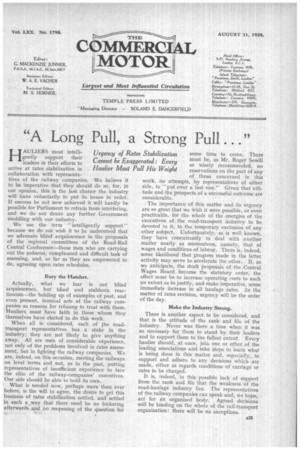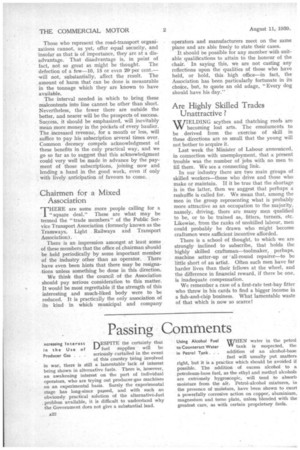"A Long Pull, a Strong Pull. . . "
Page 23

Page 24

If you've noticed an error in this article please click here to report it so we can fix it.
HATJLIERS must intelligently support their leaders in their efforts to arrive at rates stabilization in collaboration with representatives of the railway companies. We believe it to be imperative that they should do so, for, in our opinion, this is the last chance the industry will have voluntarily to put its house in order. If success be not now achieved it will hardly be possible for Parliament to refrain from interfering, and we do not desire any further Government meddling with our industry.
We use the term "intelligently support" because we do not wish it to be understood that we advocate blind acquiescence in the proposals of the regional committees of the Road-Rail Central Conference—those men who are carrying out the arduous, complicated and difficult task of assessing, and, so far as They are empowered to do, agreeing upon rates schedules.
Bury the Hatchet.
Actually, what we fear is not blind acquiescence, but blind and stubborn reactionism—the holding up of examples of past, and even present, inimical acts of the railway companies as reasons for refusing to treat with them. Hauliers must have faith in those whom they themselves have elected to do this work.
When all is considered, each of the roadtransport representatives has a stake in the industry; they are not likely to give anything away. All are men of considerable experience, not only of the problems involved in rates assessment, but in fighting the railway companies. We are, indeed, on this occasion, meeting the railways on level terms and not, as in the past, putting representatives of insufficient experience to face the elite of the railway-companies' executives. Our side should be able to hold its own.
What is needed now, perhaps more than ever before, is the will to agree, the desire to get this business of rates stabilization settled, and settled in such a ,way that there need be no bickering afterwards and no reopening of the question for some time to come. There must be, as Mr. Roger Sewill so wisely recommended, no reservations on the part of any of those concerned in this work, no attempts, by representatives of either side, to "put over a fast one." Given that attitude and the prospects of "a successful outcome are considerable.
The importance of this matter and its urgency are so great that we wish it were possible, or even practicable, for the whole of the energies of the executives of the, road-transport industry to be devoted to it, to the temporary exclusion of any other subject. Unfortunately, as is well known, they have concurrently to deal with another matter nearly as momentous, namely, that of wages and conditions of labour. There is, indeed, some likelihood that progress made in the latter activity may serve to accelerate the other. If, as we anticipate, the draft proposals of the Central Wages Board become the statutory order, the effect must be to increase operating costs to such an extent as to justify, and make imperative, some immediate increase in all haulage rates. In the matter of rates revision, urgency will be the order of the day.
Make the Industry Strong.
There is another aspect to be considered, and that is the attitude of the rank and file of the industry. Never was there a time when it was so necessary for them to stand by their leaders and to support them to the fullest extent. Every haulier"Should, at once, join one or other of the leading associations and take steps to learn what is being done in this matter and, especially„ to support and adhere to any decisions which are made, either as regards conditions of carriage or rates to be charged.
It is, indeed, in this possible lack of support from the rank and file that the weakness of the road-haulage industry lies. The representatives of the railway companies can speak and, we hope, act for an organized body. Agreed decisions will be binding on the whole of the rail-transport organization: there will be no exceptions. Those who represent the road-transport organizations cannot, as yet, offer equal security, and insofar as that is of importance, they are at a disadvantage. That disadvantage is, in point of fact, not so great as might be thought. The defection of a few-10, 15 or even 20' per cent.— will not, substantially, affect the result. The amount of harm that can be done is measurable in the tonnage which they are known to have available. The interval needed in which to bring these malcontents into line cannot be other than short. Nevertheless, the fewer there are outside the better, and nearer will be the prospects of success. Success, it should be emphasized, will inevitably mean more money in the pockets of every haulier. The increased revenue, for a month or less, will suffice to pay his subscription several times over. Common decency compels acknowledgment of these benefits in the only practical way, and we go so far as to suggest that this acknowledgment could very well be made in advance by the payment of those subscriptions, joining now and lending a hand in the good work, even if only with lively anticipation of favours to come.
Chairmen for a Mixed Association THERE are some more people calling for a "square deal." These are what may be termed the "trade members" of the Public Service Transport Association (formerly known as the Tramways, Light Railways and Transport Association). There is an impression amongst at least some of these members that the office ot chairman should be held periodically by some important member of the industry other than an operator. There have even been hints that there may be resignations unless something be done in this direction. We think that the council of the Association should pay serious consideration to this matter. It would be most regrettable if the strength of this interesting and much-liked body were to be reduced. It is practically the only association of its kind in which municipal and company operators and manufacturers meet on the same plane and are able freely to state their cases. It should be possible for any member with suitable qualifications to attain to the honour of the chair. In saying this, we are not casting any reflections upon the• qualities of those who have held, or hold, this high office—in fact, the Association has been particularly fortunate in its choice, but, to quote an old adage, "Every dog should have his day."
Are Highly Skilled Trades Unattractive ?
WIELDING scythes and thatching roofs are becoming lost arts. The emoluments to be derived from the exercise of skill in these directions are so small that the young will not bother to acquire it. Last week the Minister of Labour announced, in connection with unemployment, that a present trouble was the number of jobs with no men to fill them. We see a connecting link. In our industry there are two main groups of skilled workers—those who drive and those who make or maintain. If it be true that the shortage is in the latter, then we suggest that perhaps a reshuffle is called for. We mean that, among the men in the group representing what is probably more attractive as an occupation to the majority, namely, driving, there are many men qualified to be, or to be trained as, fitters, turners, etc. Likewise, from the ranks of unskilled labour, men could probably be drawn who might become craftsmen were sufficient incentive afforded. There is a school of thought, to which we are strongly inclined to subscribe, that holds the highly skilled craftsman—toolmaker, perhaps, machine setter-up or all-round repairer—to be little short of an artist. Often such men have far harder lives than their fellows at the wheel, and the difference in financial reward, if there be one, is inadequate compensation. We remember a case of a first-rate test-bay fitter who threw in his cards to find a bigger income in a fish-and-chip business. What lamentable waste of that which is now so scarce!












































































